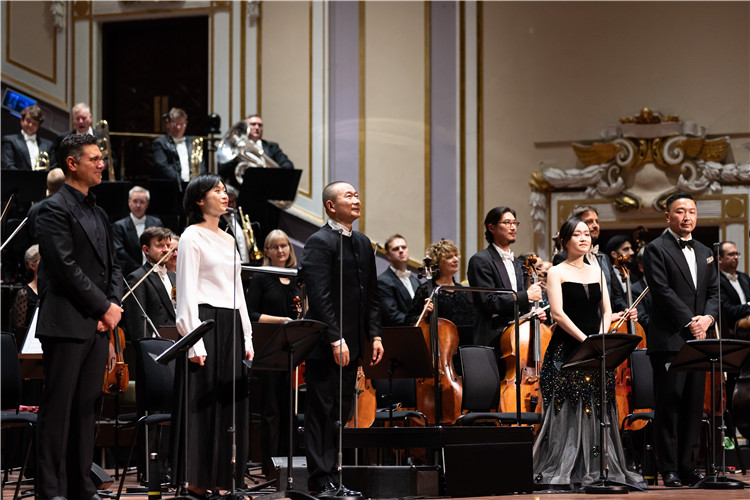From August 4th to 27th, the Edinburgh International Festival will be held in the capital city of Scotland, Edinburgh. Thousands of artists from 50 countries and regions will present over 300 events, including music, theater, opera, dance performances, film screenings, and book promotions.
The theme of this year's festival is "Where do we go from here?". The performances encompass various languages such as English, German, French, Hungarian, Korean, and others. Among them, the Chinese language programs are colorful and highly anticipated.
Renowned Chinese-American musician Tan Dun conducted his work Buddha Passion for the opening concert of the festival. On August 5th, under Tan Dun's conducting, Western instruments intertwined and resonated with Dunhuang stories, Buddhist legends, and Eastern philosophies in Edinburgh’s Usher Hall, weaving a powerful symphony that was alternately grand and vibrant, as well as soft and tranquil. The work conveyed themes of equality, friendship, loyalty, and gratitude, evoking a strong resonance among the audience.
This captivating performance was a collaboration among artists and soloists from various countries, demonstrating a successful practice of international cultural exchange. Collaborators with Tan Dun included the Royal Scottish National Orchestra, the Edinburgh Festival Chorus, and the Royal Scottish National Orchestra’s Youth Chorus. There were six soloists, including Canadian baritone Elliot Madore, who portrayed multiple roles, skillfully capturing the complex emotions of different characters. The poignant love story jointly performed by renowned Chinese singer Tan Weiwei and Mongolian horsehead fiddle player Batubagen added a dramatic element to the music. The impressive vocal performances of three singers, Chen Chen, Louise Kwong, and Samantha Chong also left a profound impression on the audience. In addition, the pipa dance performance by Chen Yining added a touch of elegance and lush lyricism to the concert.
Remarkably, for a substantial portion of the two-hour performance, the chorus members sang in Chinese with astonishing precision in pronunciation and emotional expression. Patrick Barrett, the Director of the Royal Scottish National Orchestra’s Youth Chorus, introduced that to master the pronunciation, they specifically invited a Chinese language instructor from the Royal Conservatoire of Scotland. Despite encountering various challenges over a year, the participants felt the charm of the Chinese language and enjoyed the learning process.
Mainstream British media highly praised this opening concert. The Guardian commented that there could hardly have been a better piece to open this year’s festival than Tan Dun’s Buddha Passion, which was exhilarating and joyful. The concept conveyed by the work, that "truth and interdependency are the basis for a harmonious world," resonates well with the vision of this year's festival. The Scotsman's review noted, "Sometimes music itself says much more than words. As someone influenced by both Eastern and Western cultures, Tan Dun can speak to all kinds of people who come from different traditions, different languages, and different backgrounds. Music can speak to them all."
In the second half of the festival, the "China Culture Week" will be held from August 16th to 25th. The event is co-hosted by the Art Development Center of the Ministry of Culture and Tourism of China, the China Internet Information Center, and China.com.cn’s Performance Channel. It aims to showcase the essence of Chinese drama and traditional culture. The program includes live performances of traditional Chinese operas, and screenings of various films and television works, allowing the audience to immerse themselves in an interactive exhibition center to gain a deep understanding of Chinese culture and enjoy a variety of performances.
